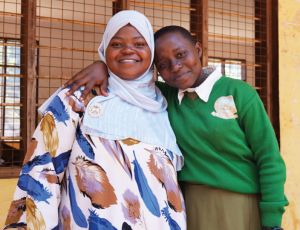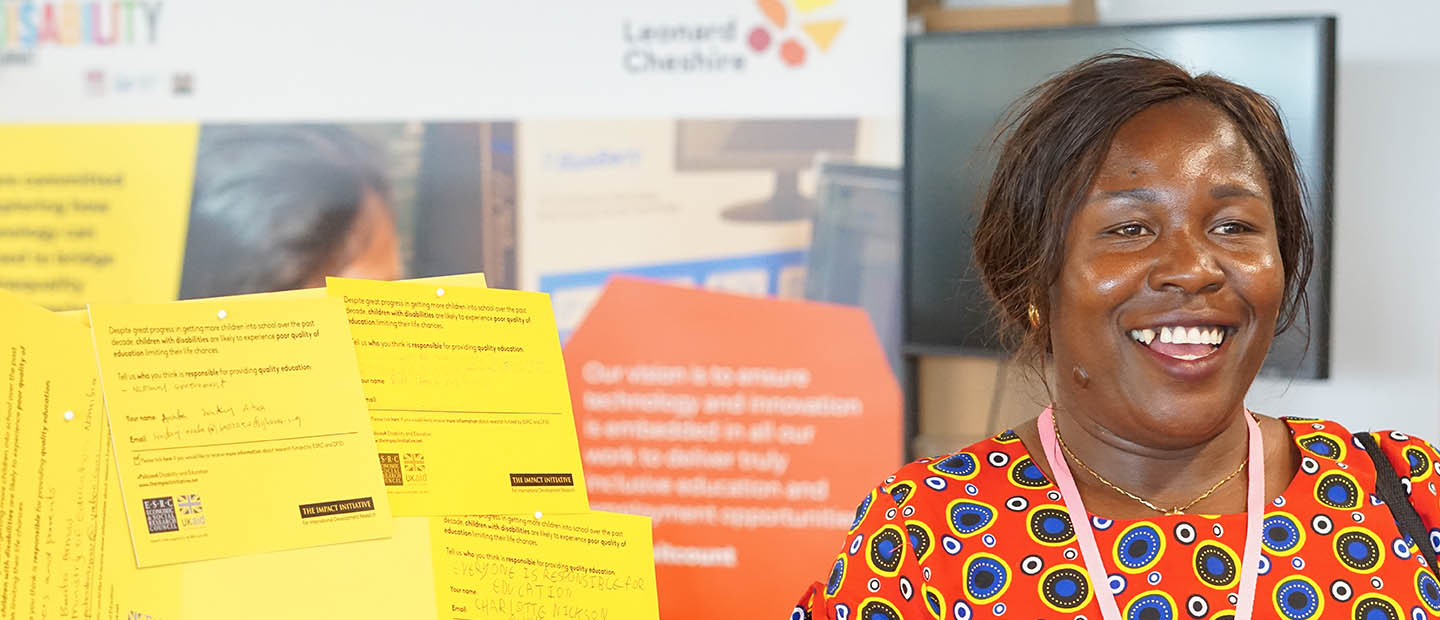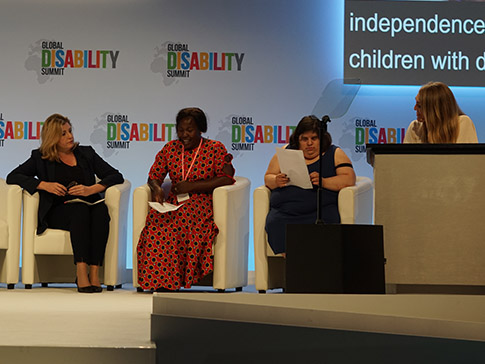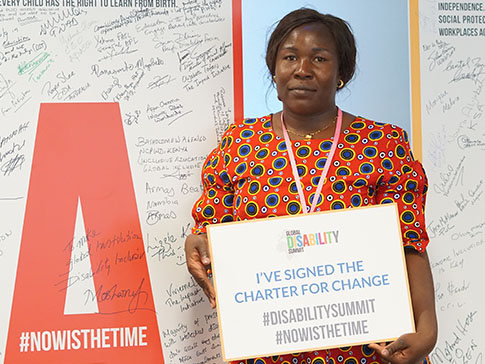
When she thrives, we all thrive
Together this giving season, we can make a difference that ripples outward to benefit everyone.


She was invited to speak one-to-one with the Secretary of State for International Development, Penny Mordaunt, during a plenary session on inclusive education. Primrose made a passionate case for quality education for all as a tool to unleash potential in individuals, communities and nations, creating fairer and more productive societies that benefit everyone.
Today when I rehabilitate children with disabilities, I use my own story and scars to show them they have a future. People like me are fighting for their rights.
Primrose Mandishona, Founding CAMA Member and Physiotherapist, Zimbabwe
Primrose brought her personal experiences to the fore, to illustrate how living with a disability should not be a barrier to success. Persevering through education and training, where she faced discrimination at every stage due to her gender and disability, Primrose has now secured her dream job as a rehabilitation technician. Primrose works closely with children, families and communities. Her expertise, grassroots activism and experience working with parents and traditional leaders allowed her to present concrete examples of best practice to inform the high-level commitments made to deliver the rights of the most marginalized children.
Here are some key recommendations she made for helping children with disabilities access inclusive education and, later, employment:
Psycho-social support
On her own path to recovery, psycho-social support was vital for Primrose to step towards an independent and fulfilling adult life. She found this in her family, particularly from an aunt who supported her through years of hospital treatment. Primrose also looked to the doctors and physiotherapists who oversaw her rehabilitation (and who sometimes bought sweets to cheer her up). These healthcare professionals, giving pastoral as well as medical support, inspired and encouraged Primrose in her own career choice.
After school, her support network came from the other young women of CAMA. She describes them as “every pillar of my strength” and says that they have given her the confidence to become who she is today. At the Summit, Primrose stressed that the importance of emotional support cannot be overestimated. It plays a central role in her work, and her advice to patients and their families is always: “You’ll be able to do it.” Primrose’s positivity is the catalyst for attitudes changing and progress for individuals and their families.
During her time in the UK, Primrose participated in a Facebook Live broadcast at the offices of Genie Ventures, answering questions from staff and followers. Video: Genie Ventures

Primrose in conversation with the Secretary of State for International Development, Penny Mordaunt, facilitated by Mia Farah and Sophie Morgan. Photo: CAMFED/Hermione Wace
Breaking down stigma
In some of the rural areas and small towns of Zimbabwe where Primrose works, she encounters the stigma surrounding disability, including disabled children being hidden away, so that even the neighbors may not know about them. “You go into the village, there are probably three children with cerebral palsy, but only one is known, the other ones are behind closed doors.”
In order to break this pattern, it helps parents, teachers and community members to see how with the right access – to healthcare, education and psycho-social support – children with disabilities can learn, thrive and demonstrate their value to society. Once that role model is there, parents start asking how they can access support.
Unlocking local resources
Primrose was interested to learn about technological advances that were on display at the Summit, but remained aware that in reality many assistive devices are out of reach for most of her patients, because family and government resources are limited.
To bridge the gap and create better inclusion and access, Primrose encourages simple and inexpensive adaptations in homes and schools. For example, commissioning a carpenter to construct a specially-adapted corner chair in the homes of children with cerebral palsy, or making parallel bars from local gum tree poles so her patients can continue their exercises at home.
Used as part of a holistic rehabilitation process, these low-tech options can reduce or even reverse the physical impairments that Primrose treats in her patients.

Primrose shows her support for the Charter for Change at the Global Disability Summit. Photo: CAMFED/Hermione Wace
A supportive community is so important for children with disabilities. Once there is no discrimination, they can excel.
Primrose Mandishona
At the close of the Global Disability Summit, the UK Department for International Development (DFID) announced that 170 commitments had been made to drive up inclusion and tackle stigma in lower-income countries. Primrose, like many of the 800 delegates in attendance, was eager to put her name against the newly introduced Charter For Change, which sets out ten points of action. These include the advancement of inclusive, quality education and championing of the most under-represented groups, including women and girls living with disabilities.
Progress towards this charter could have a transformative effect, as children living with disabilities grow up to multiply the investments made in their education. That is what Primrose has done – and as she says: “I have been given the chance, and this is me now.”
Statement of Action on Inclusive Education:
CAMFED was a key contributor to the Statement of Action on Inclusive Education, which was drafted at a workshop hosted by the Impact Initiative at the REAL Centre, University of Cambridge: “Accelerate Equitable and Quality Inclusive Education for Children and Youth with Disabilities“
Primrose Mandishona in the news:
Devex – ‘Global Disability Summit yields 170 new commitments — but what’s missing?’
Theirworld – ‘Inclusive education is crucial for children with disabilities, global summit is told’
More about Primrose:
Read Primrose’s inspiring story
Elizabeth Hall $316
Lashonda Brazil-Turner $10.9
Laura Hillstrom $106
Jackson Fahnestock $50
Fuchsia Burton $209
Ana Parke $1000
Elyce Wigham $26.6
Anya Maziak $75
Erin Cizina $211
Kelly Watts $52.9
Eric Friedman $36
Nancy Baker $106
Barbara Mifkovic $250
Ina Horn $211
Jeffrey Masters $1000